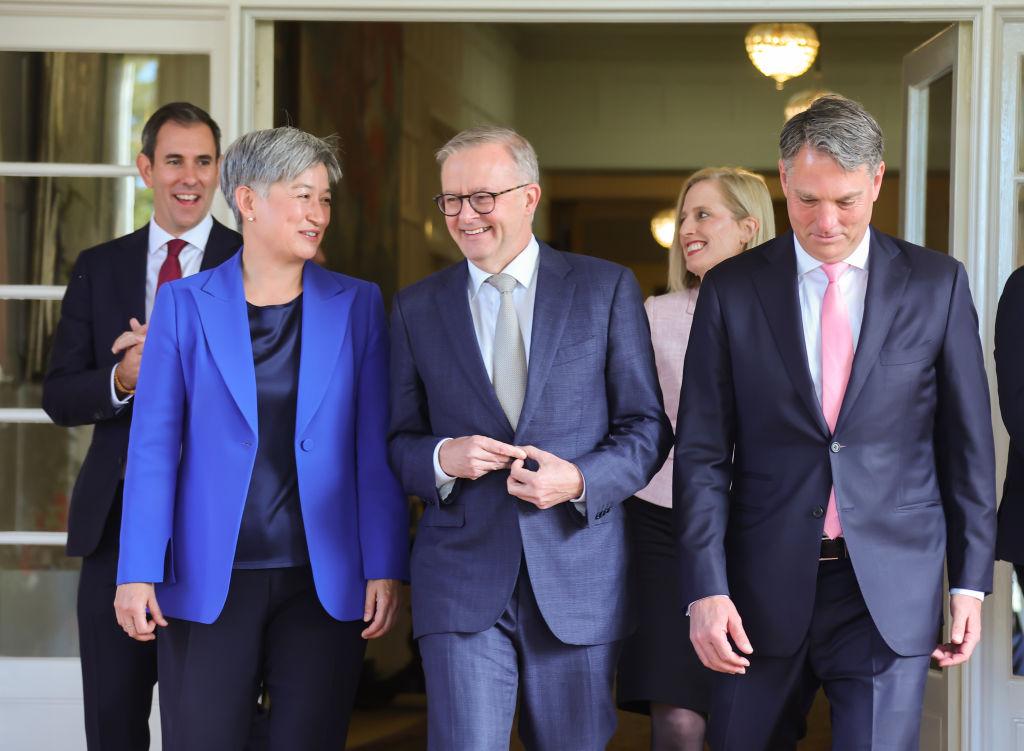
Life is tough at the top. As Australia’s new prime minister, Anthony Albanese will have barely recuperated from election night celebrations as he boards the plane to Tokyo for his first Quad summit, accompanied by Foreign Minister Penny Wong. And the stakes couldn’t be much higher: Russia’s invasion of Ukraine has strained Quad solidarity while China expands its influence in the Indo-Pacific.
As the newcomer, Albanese must build rapport. This should be easiest with US President Joe Biden as they’ve met before and Albanese has reaffirmed that the US alliance will remain the primary pillar of Australian foreign policy under Labor. Leaving aside historical debate about Labor’s past engagement, Japanese PM Fumio Kishida and Indian PM Narendra Modi will welcome assurances that Albanese is fully committed to the Quad and will not sacrifice it to improve relations with China.
Albanese must also consider his counterparts’ priorities. The host, Kishida, has objectives closest to Australian interests. Kishida has signalled that regional economic security and resilient supply chains, notably in energy and digital infrastructure, will be on the agenda—dubbed a ‘new form of capitalism’. This overlaps with Canberra’s longstanding agenda, including a bilateral hydrogen partnership, and Australia and Japan are like-minded on other priorities like regional trade architecture.
For Biden, his delayed first presidential trip to Asia must reassure allies that the US can still walk and chew gum as tensions rise simultaneously in Europe and the Indo-Pacific. Thankfully, he remembered his chequebook. But launching the Indo-Pacific Economic Framework (IPEF) alongside Kishida cannot veil US absence from the Trans-Pacific Partnership, and the sums involved will never rival China’s Belt and Road Initiative. Albanese should encourage Biden to make IPEF the foundation for a larger US economic offer to the region.
Modi requires Quad partners to respect India’s complex relationship with Russia. Albanese should strike a positive tone, building on momentum in the Australia–India relationship. India is primarily invested in the Quad because of China, which threatens its border and encroaches in its neighbourhood. Delhi shares Western alarm at the ‘no limits’ friendship announced by Vladimir Putin and Xi Jinping on 4 February. But India relies on Russia in critical sectors, including defence.
Rather than harangue him over Ukraine, Albanese should tap Modi’s insights into Putin’s and Xi’s thinking. At the press pulpit, Albanese can highlight India’s regional contribution, including manufacturing Quad vaccines. He should oppose split-wording on Russian aggression in the communique. Privately, Albanese needs to express understanding of India’s unique circumstances, explore ways to lessen India’s dependence on Russia and offer help with regional challenges like the ongoing crisis in Sri Lanka.
Forearmed with a grasp of his counterparts’ views, Albanese should keep an unwavering focus on a handful of Australian aims from this summit. He has already revealed that one priority will be climate change. That’s fine as far as it goes: Biden in particular will appreciate Australia shrugging off the cognitive dissonance that constrained engagement under former PM Scott Morrison. But the organising principle of the Quad is China. Albanese must address how to bind the world’s largest polluter into climate solutions without horse-trading core interests.
Australia’s real skin in the Quad game is countering Chinese expansion by building sovereign resilience, amongst partners and across the Indo-Pacific. Albanese can point to Labor’s early commitment of resources to Southeast Asia. But he shouldn’t labour the point—it will take much more than a modest, election-inflected funding commitment to challenge China’s tightening grip in Southeast Asia.
Instead, a comprehensive program that includes massive infrastructure investment is essential. A profusion of grand ideas and acronyms—IPEF, BBW, BDN, SEAGIF—must start translating to tangible ports and digital connectivity soon, because China is already reforming the physical and regulatory landscape. And wider partnerships matter: the Quad’s infrastructure partnership needs a clearer mechanism for coordinating with the G7 as it engages ASEAN.
His Quad counterparts will expect Albanese to lead on the South Pacific. Beyond Solomon Islands, Chinese Foreign Minister Wang Yi’s upcoming Pacific odyssey will likely include further nasty surprises, perhaps including a new pact with Kiribati, another recent convert from Taiwan. If that happens, Labor will face the same accusations of failure that it levelled at Morrison’s Coalition—an early wake-up, if one were needed, that the new Chinese ambassador’s olive branch is barbed.
But however high the domestic stakes over the Pacific, Albanese should retain some perspective—Japan and India both face direct Chinese challenges to their territorial integrity, and the great game in the South Pacific should be addressed in the context of a Chinese expansionary playbook across the region. That means genning up on thorny hotspots, including Taiwan, the South China Sea and North Korea. The Quad is not a military alliance, but it cannot dodge discrete planning for increasingly real regional contingencies. And fumbling the detail on these in front of the media has consequences.
Lastly, don’t forget those not at the table. The customary genuflecting to ASEAN centrality in public remarks is necessary but insufficient to calm regional anxiety about being sidelined. While the Quad membership is fixed, it makes sense to collaborate with a wider circle in niche areas, like critical technology, as Biden agreed with South Korean President Yoon Suk-yeol. Think tanks can play a scoping role, as shown by New Zealand and UK participation in ASPI’s Sydney Dialogue.
However hard this crash course in global summitry feels, Albanese and Wong will find that it’s the easy part. What happens when Beijing rediscovers Canberra in the phonebook?